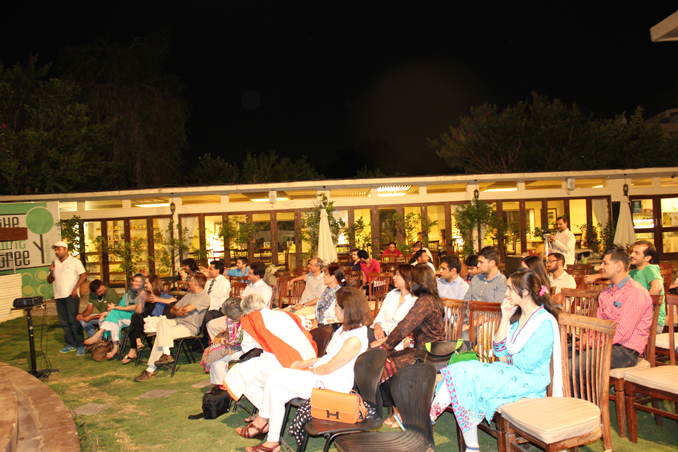Written by: Zahra Belal - Posted on: June 13, 2014 |  Comments
Comments
Google Translation: اُردو | 中文
The stage of Kuch Khaas was set, chairs lined up and lights on full beam. All this wasn’t as one would expect for an entertainment show. The banner up front made the objective clear; “Islamabad Green: Save Islamabad Campaign”. Bringing together specialists and activists on environment, as well as the concerned denizens, this was a second gathering by the Islamabad Green and Kuch Khas to discuss and raise awareness about the Metro Bus project and other environmental issues degrading the scenic and beautiful capital of Pakistan.
Moderated by Christina Afridi, member of the Islamabad Green, the forum made it clear at the very outset; “We are not against the mass transit system”. Successive speakers urged the citizens to not consider this as a ‘for or against’ front on the project but to rise above it to scrutinize the way the project is being implemented and what impact it would have on the environment. “We want to ensure damage control, and not a wrap-up of the project,” said Christina Afridi.
This is why Bilal Haque and Jawad Chisti, members of the Islamabad Green, highlighted the ways in which the projects irks them from the perspective of environment and what kind of damage control measures have been taken by the group. The lack of planning, credible cost-benefit analysis and a proper environmental impact assessment were highlighted as some of the issues, the implications of which look sorry; the steel and concrete ‘janglas’ expected around the Metro Bus route will raise the internal temperature of the city, meaning that you would feel the temperature to be 46C when it’s only 42C. This issue has been one of the feathers in the group’s cap; the CDA Chairman assured the group at a public hearing on May 22 that there will be no ‘janglas’ or raised platforms. Other endeavours of the group have been a writ petition to the Supreme Court, public hearing in collaboration with the EPA and press conferences to raise public awareness and interest.
 |
The young and energetic Iman Mazari presented some of the work that she carried out to evaluate the impact of the project on the inhabitants of the slum areas of H-9, the hub of the construction in Islamabad. With candid pictures and narrative, she informed the audience that the inhabitants are suffering acute psychological and health costs, particularly breathing and sleeping irregularities. Furthermore, no efforts have been made to ameliorate their problems; in point of fact, they were not even informed, let alone consulted about the project. “When I asked them if they had been consulted about the project, they laughed it off as if that was even a possibility,” Mazari explained.
Offering other alternatives for transit was Zehra Kamal, representing Critical Mass Islamabad and Islamabad Cycling Associates, who called for promoting cycling as a sport and means of transport. Her recommendation was to gel in some eco-friendly measures with the Metro Bus project by creating cycling routes to the stations and allowing people to carry their cycles on the bus. She also pointed out that roads must be made cycling friendly with penalties for those who park or drive their vehicles on the cycling lane and an effort to shade these lanes to make cycling more comfortable during the summers.
The concerned citizens raised their issues and highlighted ways in which a communal effort could be made for environmental protection. Dr. Dushka Saiyid, member Islamabad Green, encouraged all to join hands and make a concerted effort, without which all endeavours would be in vain. “There is no political or partisan agenda here; there is no money involved,” she spoke out. “All this is voluntary and passionate activism to save the beauty that we have in this city”.
Shafqat Kakakhel, member board of directors of SDPI, brought home the undercurrents of the gathering in his eloquent and lucid speech. “Unfortunately, there are rapacious and predator elements in our socio-political order who want to defile and desecrate our hills and committee all sorts of aggression against nature for their own interests,” he explained. “This is why what we need here is constant vigilance by the citizens, who are the most reliable and indispensable stakeholders in all this.” Power to the people; voice to the trees!